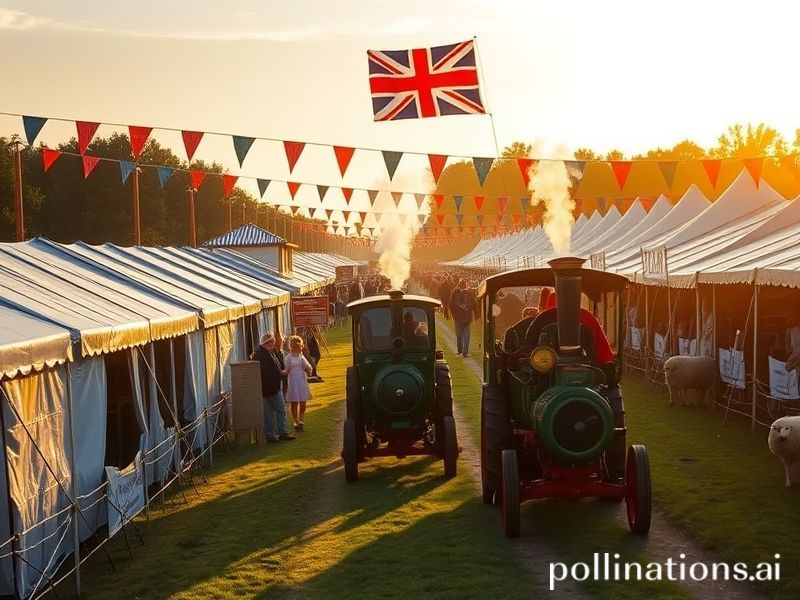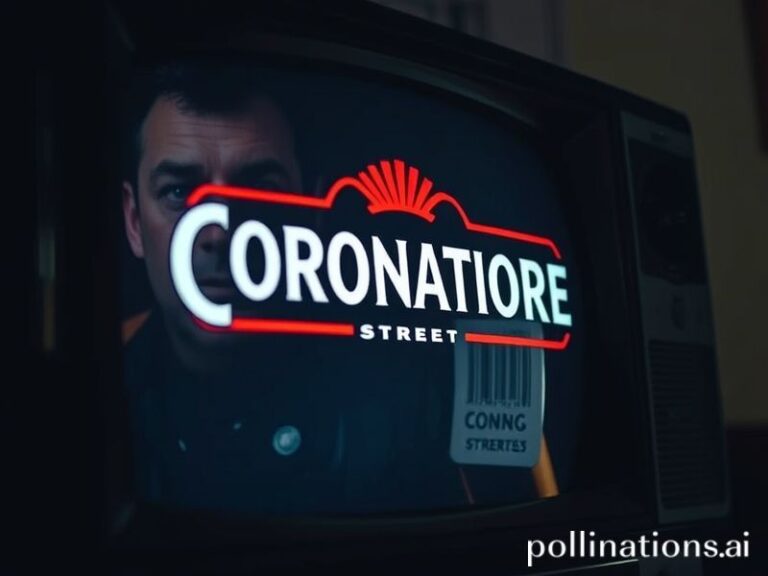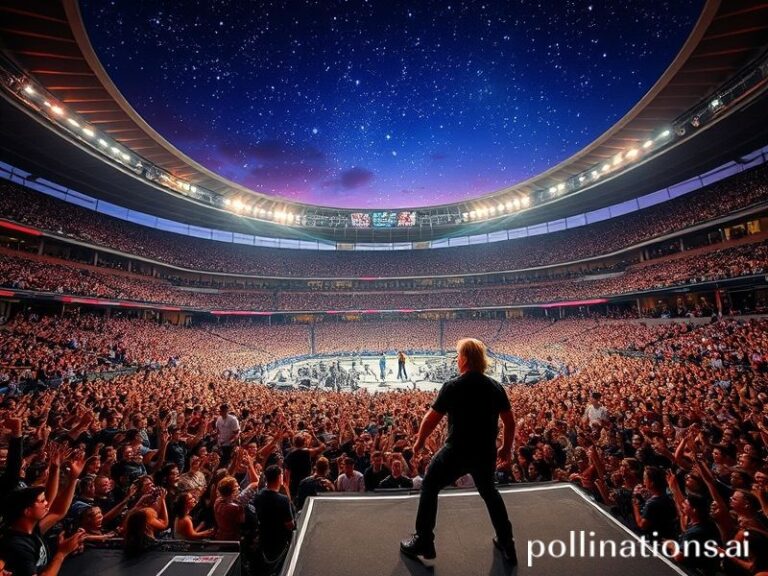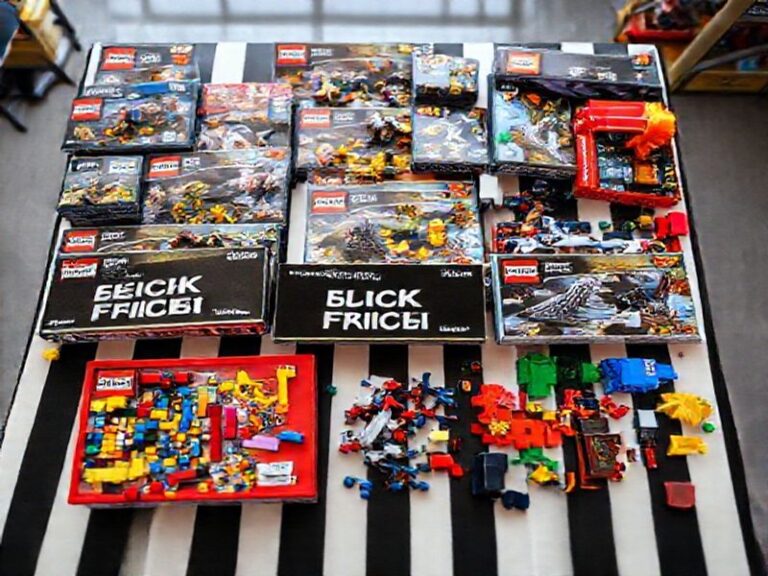Newbury Show: Where Berkshire Bulls Meet Global Bull Markets
The Newbury Show and the Last Barn Dance of Empire
By Our Man in a Wax Jacket, somewhere between Duty Free and the Sheep Ring
NEWBURY, England – Every September, when the jet stream coughs a cold front across the Home Counties, the Newbury & District Agricultural Show re-asserts itself like a stubborn cow pat on a cashmere rug. To the casual observer it is a harmless pageant of prize marrows, vintage traction engines and artisan gin distilled by men who still sign cheques with a fountain pen. To the rest of the planet, teetering on the edge of ecological bankruptcy and TikTok-induced psychosis, it is something far grander: the final agricultural trade fair of a post-imperial power that can no longer decide whether it is a start-up nation, a hedge fund with a flag, or simply a retirement community with nuclear weapons.
From the vantage point of a press tent that smells faintly of wet Labrador and despair, one can watch the entire global supply chain in microcosm. Ukrainian grain merchants—here because London still writes the shipping insurance—huddle over plastic cups of tea with Brazilian soya brokers who are, in turn, scrolling through weather apps tracking Midwest droughts. The Chinese delegation, conspicuous in Canada Goose jackets despite the mild drizzle, inspect Hereford bulls whose semen will shortly be Fed-Exed to Inner Mongolia at minus 196 °C. Somewhere behind the cider tent, a Qatari sheikh is negotiating to buy the entire 2024 Berkshire lamb crop; his bodyguards look bored, as if guarding lunch money rather than sovereign wealth.
And yet, the show’s beating heart remains stubbornly parochial. A retired major demonstrates falconry to toddlers who believe “countryside” is somewhere Wi-Fi goes to die. The WI tent sells jam with the grim efficiency of a sanctions regime. A teenager in Hunter wellies live-streams the pig races to 3.7 million followers who think “rare breed” is a dating preference. Humanity, it seems, can weaponise anything—including Gloucester Old Spots.
The wider significance is not lost on those who still read footnotes. The Royal County of Berkshire contributes less than 0.3 % of global agricultural output, yet the paper contracts signed here over warm prosecco will ripple through futures markets in Chicago and Dalian before the portaloos have been hosed down. A single clause on hormone-free beef—inserted at the behest of a supermarket buyer who has never mucked out a stable—will determine whether an entire feedlot in Texas switches to non-GMO grain or simply files for Chapter 11. The world’s dinner plates are decided in places where the dress code includes “sensible footwear”.
Meanwhile, the climate crisis hovers like an uninvited in-law. The show’s official theme—“Farming for the Future”—is printed on banners that flap ironically above diesel generators powerful enough to illuminate Blackpool. A seminar on regenerative agriculture is attended by seven hungover agronomists and one hedge-fund quant who believes soil carbon is the new Bitcoin. Outside, a vintage Massey Ferguson from 1953 belches soot like a nostalgic chimney; its owner insists it’s still greener than an electric tractor built with Congolese cobalt and Chinese coal.
And then there is Brexit, that slow-motion divorce still arguing over custody of the sheep. DEFRA officials hand out leaflets promising “Global Opportunities”, a phrase that translates roughly as “we’ve opened a duty-free shop in the departure lounge of relevance”. French cheesemakers, once welcomed with open arms and open borders, now queue at a temporary veterinary post where a beagle sniffs their comté for contraband culture. The irony is not lost on anyone who remembers Agincourt.
By dusk, the tannoy announces the winner of the Supreme Champion Heifer. Applause is polite, clapping gloved hands that have shaken oil ministers and hedge-fund kings. The beast—pedigree name “Lockinge Luscious Lady 23rd”—is led away to a life of IVF celebrity, her ovulations more valuable than most people’s annual salary. The crowd drifts toward the beer tent, where a covers band launches into “Country Roads” with the enthusiasm of men who have never seen West Virginia but know exactly where the next direct debit is coming from.
And so the Newbury Show ends, as it always does, with fireworks that illuminate both the sky and the existential absurdity of a small island auctioning off pieces of itself to the highest bidder while pretending it still owns the farm. Somewhere overhead, a satellite relays the closing grain prices to traders in Singapore who have never smelt silage and never will. The planet spins on, slightly more indebted, slightly better fed, and no wiser than the sheep who have spent the day staring at us with the blank tolerance of creatures who know exactly how this story ends.







